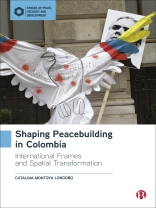During the second half of the 20th century, Colombia suffered extreme levels of political violence. This book explores the involvement of the international community in peacebuilding efforts in Colombia since 2016. In particular, it examines how interventions were framed in order to promote and sustain their involvement and questions whether these frames reflected reality within Colombia.
The book focuses on key donors, including the US, the EU, Canada, Sweden and the UK, as well as multinational actors, such as the UN and the World Bank, to demonstrate how their framing of local issues for national and international consumption can have real world implications for peacebuilding efforts on the ground.
Spis treści
Introduction
1. Theoretical Assumptions: Framing Projections in International Scenarios
2. Spatial Framing and Methodology Choices
3. Peacebuilding Efforts in Colombia: National Agendas and Management of International Cooperation
4. Peacebuilding Efforts in Colombia: Bilateral and Multilateral Cooperation
5. Local Views Regarding International Actors
6. International Actors’ Framing of Peacebuilding Spaces
7. International Actors’ Framing of Peacebuilding Agendas
8. Conclusions
O autorze
Catalina Montoya Londoño is Senior Lecturer in International Relations at Liverpool Hope University. Catalina is also the Director of the Archbishop Desmond Tutu Centre for War and Peace Studies, as well as for the MA in Politics and International Relations.












